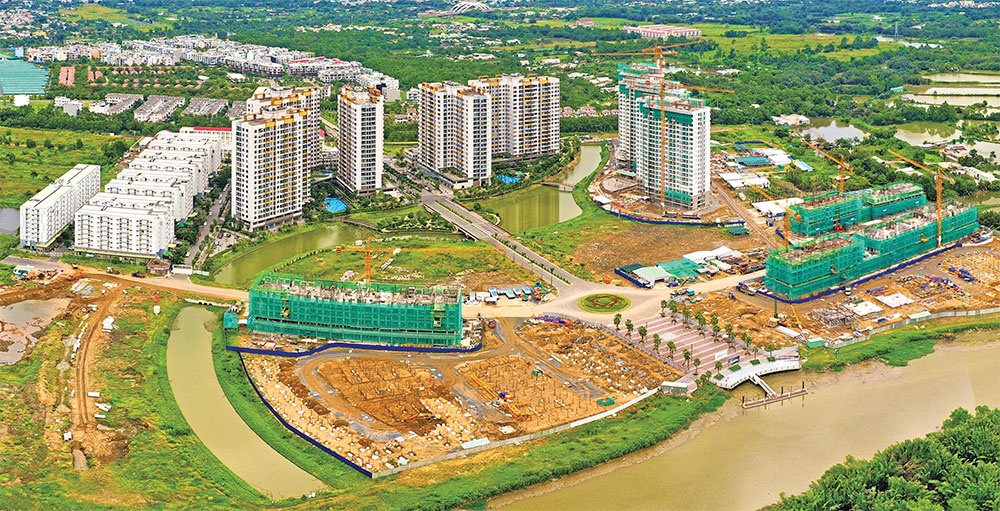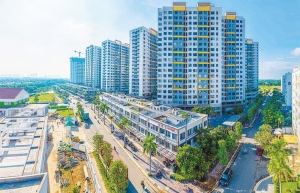Real estate project standstill no longer deemed acceptable
The recent stagnation of the real estate market is largely due to legal problems, according to the Ministry of Construction. There are more than 1,000 projects at a standstill nationwide and, of those, around 400 have encountered difficulties in project implementation in Hanoi and Ho Chi Minh City.
 |
| Real estate project standstill no longer deemed acceptable, photo Le Toan |
In the tourism real estate segment alone, by the end of 2022, the country has about 83,000 condotel units awaiting ownership certificates, most of which belong to resort projects, using commercial and service land funds with a lifespan of 50-70 years.
Due to legal issues, few projects are approved in time, leading to a serious lack of supply, especially for low-cost housing
“The lack of supply plus increasing costs have left real estate prices in Vietnam much higher compared to people’s incomes,” said Can Van Luc, member of the National Financial and Monetary Policy Advisory Council, at a real estate roundtable hosted by VIR last week.
Luc said that regulations on land, construction, and real estate were extremely complicated, involving more than 100 decrees, circulars, and other instructions that are rife with inconsistencies.
The latest survey by the Vietnam Real Estate Research Institute released in March cited that 65 per cent of difficulties of real estate businesses come from policy and legal problems, 20 per cent from capital, and 15 per cent from market factors.
Nguyen Quoc Hiep, chairman of GP Invest, said that the lack of a legal mechanism was hindering his company’s latest project.
“I hope legal issues will be quickly and transparently resolved. Businesses can access capital sources in different ways, but we cannot handle the legal procedures,” Hiep said.
Nguyen Hai Thao, a lawyer at Mayer Brown, said that while there is overlapping of laws in the current system, the actual interpretation of the law was also a concern.
“In each case, each locality has a different interpretation. This creates difficulties for investors and businesses. Lawyers therefore also have to adjust their advice and update on the latest interpretation and regulations of authorities,” Thao said.
In addition, the regulations are often incomplete or inappropriate, leading to a lack of implementation basis. This causes hesitation and fear of wrongdoing from a number of authorised officials, slowing the system down.
Other challenges cited at the seminar last week were cash flow difficulties and credit growth, including capital inflows into the real estate market, which has dropped sharply and shows no signs of recovery.
The first quarter of 2023 only reached 1.6 per cent and bond maturity pressure is still at a high level. The total value of individual corporate bonds maturing in 2023 is estimated at $10.2 billion, of which real estate businesses have a balance of about $4.3 billion.
Le Xuan Nghia, another member of the National Monetary and Financial Policy Advisory Council, said for the capital flows to improve, restructuring of corporate bond debt must be looked at, as well as negotiating with investors on asset swaps to liquidate corporate bonds and sell projects to repay debts.
“If prices of assets with high solvency seriously decrease, businesses will go bankrupt. In addition, they cannot just sit and wait, but need to make efforts at self-advocacy, and even to accept the liquidation of assets to handle their debts,” Nghia said.
Despite a revised legal system on the way and more capital set to flow into the market, Nghia said it would take time for the new regulations to become a reality.
“New policies often take 6-12 months before having a real effect. However, the positive effect of the policy on market sentiment will show in the liquidity and selling indicators of investors,” Nghia said.
According to Vuong Duy Dung, deputy director of Housing and Real Estate Market Management Department, market issues and the operation of real estate businesses pose many problems for the government and management agencies, and also businesses themselves.
“In recent times, the government has offered drastic and specific instructions, assigning tasks to local ministries and agencies to implement many solutions to help market. This is a hard time for developers and investors. However, it is also an opportunity to adjust and restructure their business accordingly,” Dung said.
Nguyen Van Dinh, deputy chairman of the Vietnam Real Estate Association, proposed specific regulations to implement the announced VND120 trillion ($521.7 million) package.
“This is a very valuable tonic for the market. Along with that, it is necessary to specify clear regulations on the groups that can access this capital,” Dinh said. “Apart from the target groups of social and affordable housing developers, nearly finished real estate projects that lack capital should be supported with more capital injections. If these are opened, they will stimulate supply.”
| Angus Liew - Chairman Gamuda Land Vietnam
The government has made improvements in terms of the regulations and laws for the real estate industry over the years. But, of course, we still see some room for improvement. If submissions can be carried out online, procedures will be quicker. They also become more transparent and easier for us to track the status of our submissions. The other thing is to de-regularise some of the procedures which would speed up the process. Let the professional bodies do the work and the government can carry out random inspections. This could probably save some time for both the government and developers. Another thing is that the land procedures in Vietnam are pretty long. The government’s efforts to carry out auctions are good because when the government carries out the compensation and auction, the developers can start right away. The government should look into how to make auctions more transparent. One more thing I would like to suggest is to have a task force together with foreign and local developers to look into how to speed up submissions. There are still a lot of opportunities in the real estate industry. If things can be carried out more efficiently, the cost of buying houses will be more stable for everyone. Gibran Bukhari - Head of Sales Masterise Homes
Customers are currently not as enthusiastic as before. This is understandable because there have been incidents and rumours in the market that have caused them to lose confidence. Customers, especially investors, tend to wait and observe more. There is also a group of people who believe that they can wait for the market to hit the bottom before making a purchase. However, I believe that this is also the phase of the real estate market where “fire proves gold”. Properties with real value, providing a liveable space for end-users, will continue to draw customers. Therefore, customers and investors should not seek out products that are currently reducing prices because they are, in fact, adjusting to their real values. Developers who have strong finance and capability will continue to fulfill their commitments to customers, even bringing added value to increase customer confidence. We will strengthen customer confidence by delivering good progress and quality that meets our commitments. In the past month alone, Masterise Homes has topped out three projects. In addition, we are also about to open some on-site mock-up units so that customers can experience the true quality of design, construction, and finishing. Motivation is also created through value-added solutions for customers, such as flexible payments. Furthermore, we will expand our sales network to the international market. Contrary to domestic customers, foreign customers have strong confidence in the potential of Vietnamese real estate. Therefore, we are continuing to promote sales activities in the foreign market, and such transactions will also boost confidence for domestic customers. |
 | Real estate hoping to build on positive sentiment The credit growth cap and setting up a working group to solve problems for businesses and localities in the implementation of real estate projects are optimistic signals for the real estate market, which still expects a tough winter ahead. |
 | Lenders must embrace responsibility to real estate The banking system is under pressure to assist the real estate market through recent turbulence. Dr. Le Xuan Nghia, member of the National Financial and Monetary Policy Advisory Council, talked with VIR’s Hong Dung about the situation and projections for what is to come. |
 | Solutions are within reach for Vietnam’s real estate market The global geopolitical crisis, prolonged Russia-Ukraine war, strikes, and political instability in Europe are all having negative impacts on the global economy, and in Vietnam. |
 | Nation’s real estate requiring a greater policy drive The second quarter of this year will see new legal documents issued that will alleviate difficulties in Vietnam’s real estate market. Nguyen Van Dinh, deputy chairman of the Vietnam Real Estate Association, spoke with VIR’s Hai Van about the issues involved. |
 | Real estate needs urgent legal, supply, and capital reform Dr. Can Van Luc, a member of the National Financial and Monetary Policy Advisory Council, gave his view on the real estate sector during the VIR-held seminar "Untangling Real Estate: Promoting Growth" on April 19. |
What the stars mean:
★ Poor ★ ★ Promising ★★★ Good ★★★★ Very good ★★★★★ Exceptional
Related Contents
Latest News
More News
- Construction firms poised for growth on public investment and capital market support (February 11, 2026 | 11:38)
- Mitsubishi acquires Thuan An 1 residential development from PDR (February 09, 2026 | 08:00)
- Frasers Property and GELEX Infrastructure propose new joint venture (February 07, 2026 | 15:00)
- Sun Group led consortium selected as investor for new urban area (February 06, 2026 | 15:20)
- Vietnam breaks into Top 10 countries and regions for LEED outside the US (February 05, 2026 | 17:56)
- Fairmont opens first Vietnam property in Hanoi (February 04, 2026 | 16:09)
- Real estate investment trusts pivotal for long-term success (February 02, 2026 | 11:09)
- Dong Nai experiences shifting expectations and new industrial cycle (January 28, 2026 | 09:00)
- An Phat 5 Industrial Park targets ESG-driven investors in Hai Phong (January 26, 2026 | 08:30)
- Decree opens incentives for green urban development (January 24, 2026 | 11:18)



 Tag:
Tag:




















 Mobile Version
Mobile Version